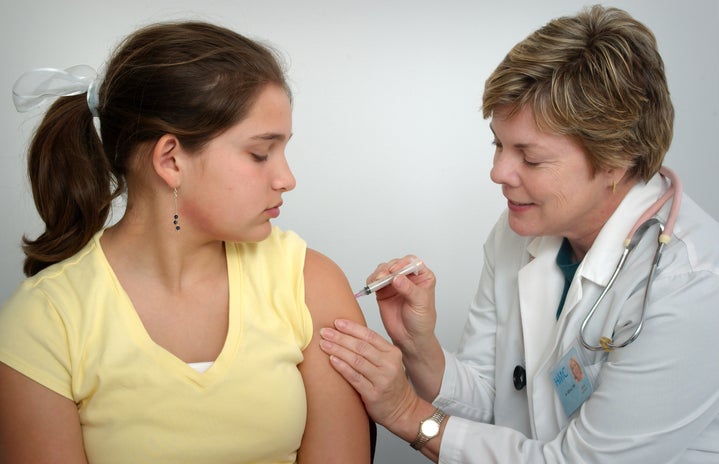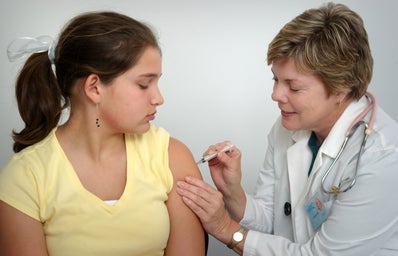On April 13th, the United States federal government placed a pause on the Johnson and Johnson (also known as Janssen) vaccine due to a potential link to blood clotting. When the vaccine was suspended, six women between the ages of 18-48 developed blood clots after recently getting the J&J COVID-19 vaccine. So far, one of the six women has died. This specific type of blood clot, technically called “cerebral venous sinus thrombosis” (CVST) and also sometimes referred to as “thrombosis with thrombocytopenia syndrome” (TTS), is much more rare than typical blood clots. It involves clotting of the blood associated with low platelet levels which can be especially dangerous as it forms in the brain and does not respond well to traditional blood thinners.
However, I personally believe that despite this potential link, it should not have been enough to cause the government to stop all administrations of the vaccine for several days. Clotting of the blood is not an unusual phenomenon: blood clots cause an estimated 100,000 deaths in the United States every year. In addition to natural causes such as age, gender, or genetics, there are also several FDA approved medications that are known to significantly increase one’s risk of developing dangerous blood clots. Blood clots are not new to us, and people have suffered from them for a long time.
One of the most widely used and popular types of medication that has a risk of blood clotting is hormonal birth control. For decades, women have been taking contraceptives that have come with the slight disclaimer of a 0.03-0.09% chance for developing blood clots. While that rate is definitely very low, when compared to this vaccine’s 0.0000009% blood clot rate, it seems much more of a cause for concern than that of J&J’s product. It bothers me that women have been subject to small warning labels when 6 out of 6.8 million people have inspired such intense attention into these side effects. I am well aware that it is not quite a direct comparison due to these blood clots not being considered nearly as fatal, but the fact is that all types of blood clots are dangerous. It is frustrating to me that there seems to be a disproportionate amount of caution attributed to the vaccine rather than to other medications that affect many more people.
It is worth mentioning that not a significant amount of the women who developed the blood clots were using hormonal contraceptives. However, high levels of estrogen in general are associated with higher risks of blood clots, meaning that women tend to have higher risks of blood clotting than men. The vaccine proved no exception, in that almost all of the patients who developed CVST after receiving the dose were female.
The pause has spread to other areas of the world as well. The EU had only just approved the Janssen vaccine for use when the United States paused it. Johnson and Johnson announced later that they would hold off on their vaccine rollout in Europe. This is following a very similar pause and struggle with the AstraZeneca vaccine developed in conjunction with Oxford University (not yet authorized for use in the United States) after similar reports of TSS blood clotting. With J&J’s abundance of caution, they have made it even more difficult for the EU nations to vaccinate citizens. Johnson and Johnson is a single dose vaccine, and therefore has the potential to be exceedingly useful to vaccinate people in areas where they do not have the ability to get a booster (low income, rural, etc.).
Pausing the vaccine is not without its own direct consequences to the United States either. While some people viewed it as an indication the government is putting safety as their utmost priority, I would argue that other members of the public—likely those who are already skeptical of the new vaccines—see it as another reason not to trust them. There was a drop in public confidence in the Johnson and Johnson vaccine following the pause, and it has become evident that people are still wary of the COVID-19 shots. Overall, it creates an even bigger decline in public confidence in the vaccination process when we are already struggling against widespread vaccine hesitancy.
At the end of the day, we have to realize that the coronavirus kills more people than the vaccine does. If pausing the vaccine is going to lead to more people distrusting the vaccination process and refusing to receive the shot, then it has the potential to do more damage than good. Currently, predictions are saying that we are not going to be able to reach herd immunity in the near future due to the abundance of citizens who have declared that they will not get vaccinated against COVID-19.
We have as a society accepted that taking drugs and medication in general will never be without risk. It is a leap of faith sometimes trusting whatever new drug our doctors prescribe. We all choose to ignore it in commercials when drug companies speak faster than normal people can comprehend in order to keep you from dwelling on the negative side effects associated with their medication. There was always going to be the potential for some risks with the new vaccines. I understand that it is important to be aware of these and allow citizens to be able to make the decision whether or not to get the Johnson and Johnson vaccine over other brands such as Moderna or Pfizer/BioNTech. My intention is not to belittle those who suffered from CVST, but I believe that there could have been better ways for the government to address this obstacle. By making people aware of the potential risks without fully pausing it, thus building it into a larger problem than it was, creates more public worry and potential vaccine hesitancy than I personally think it was worth.
If you have ever felt like you can never find jeans that fit, I would highly suggest giving Madewell a try. These jeans may not work as well for you as they did for me, but hey, that’s what returns are for. Buying Madewell jeans will be an investment, but it will be so worth it to feel cute and comfortable for years to come.

